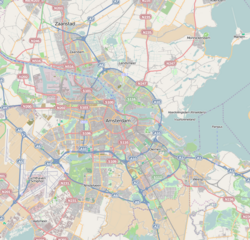
The Rijksmuseum is the national museum of the Netherlands dedicated to Dutch arts and history and is located in Amsterdam. The museum is located at the Museum Square in the borough of Amsterdam South, close to the Van Gogh Museum, the Stedelijk Museum Amsterdam, and the Concertgebouw.
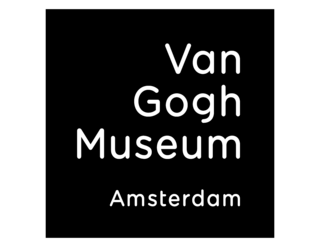
The Van Gogh Museum is a Dutch art museum dedicated to the works of Vincent van Gogh and his contemporaries in the Museum Square in Amsterdam South, close to the Stedelijk Museum, the Rijksmuseum, and the Concertgebouw. The museum opened on 2 June 1973, and its buildings were designed by Gerrit Rietveld and Kisho Kurokawa.
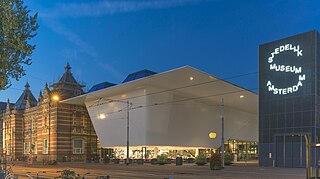
The Stedelijk Museum Amsterdam, colloquially known as the Stedelijk, is a museum for modern art, contemporary art, and design located in Amsterdam, Netherlands.

Leiden University Libraries is a library founded in 1575 in Leiden, Netherlands. It is regarded as a significant place in the development of European culture: it is a part of a small number of cultural centres that gave direction to the development and spread of knowledge during the Enlightenment. This was due particularly to the simultaneous presence of a unique collection of exceptional sources and scholars. Holdings include approximately 5,200,000 volumes, 1,000,000 e-books, 70,000 e-journals, 2,000 current paper journals, 60,000 Oriental and Western manuscripts, 500,000 letters, 100,000 maps, 100,000 prints, 12,000 drawings and 300,000 photographs. The library manages the largest collections worldwide on Indonesia and the Caribbean. Furthermore, Leiden University Libraries is the only heritage organization in The Netherlands with five registrations of documents in UNESCO's Memory of the World Register.

The Royal Library of the Netherlands is the national library of the Netherlands, based in The Hague, founded in 1798.

The Kunstmuseum Den Haag is an art museum in The Hague in the Netherlands, founded in 1866 as the Museum voor Moderne Kunst. Later, until 1998, it was known as Haags Gemeentemuseum, and until the end of September 2019 as Gemeentemuseum Den Haag. It has a collection of around 165,000 works, over many different forms of art. In particular, the Kunstmuseum is renowned for its large Mondrian collection, the largest in the world. Mondrian's last work, Victory Boogie-Woogie, is on display at the museum.

Naturalis Biodiversity Center is a national museum of natural history and a research center on biodiversity in Leiden, Netherlands. It was named the European Museum of the Year 2021. Although its current name and organization are relatively recent, the history of Naturalis can be traced back to the early 1800s. Its collection includes approximately 42 million specimens, making it one of the largest natural history collections in the world.
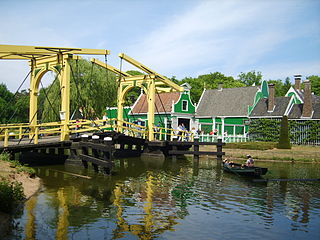
The Netherlands Open Air Museum is a national open-air museum located in Arnhem. It focuses on the culture associated with the everyday lives of ordinary people, and demonstrating the old way of life in the Netherlands.

The Wereldmuseum Amsterdam is an ethnographic museum located in Amsterdam, Netherlands, founded in 1864.
The Museum Card, also known as the Museumkaart in Dutch, is a personal card that grants free entry to approximately 400 museums in the Netherlands for one year. It is available for purchase at many of the larger participating museums or online, with a temporary card issued when purchased from the museum. While most museums offer free entry to Museum Card holders, some museums may charge an additional fee for special exhibitions, but not for general collections.

Levie Jacob "Louis" Fles was a Dutch businessman, activist and author. He is best known for writing and broadcasting against Zionism, Nazism, and organized religion. A self-described freethinker, Fles was a vocal supporter of Humanism and Jewish assimilation. His relationship with the Dutch Social Democratic Workers' Party was more problematic. While he generally supported the ideals of socialism, he wrote extensively about his disagreements with the party as well. After a life filled with personal tragedy and devotion to political and social activism, Fles committed suicide in May 1940, only a few weeks after the German occupation of the Netherlands.

Johannes "Johan" Gerardus Diederik van Hell was a Dutch visual artist and musician. His work was included in the 1939 exhibition and sale Onze Kunst van Heden at the Rijksmuseum in Amsterdam. He was a dedicated socialist and a man with a highly developed social conscience. Many of his later works depict the struggles and plight of ‘the man in the street’. In 1925, he decided to produce lithographs to make art available at a reasonable price to the working class. He also gave free private art and music lessons to gifted students who could not afford the tuition.

Eye Filmmuseum is a film archive, museum, and cinema in Amsterdam that preserves and presents both Dutch and foreign films screened in the Netherlands.

Zaans Museum is a museum in Zaandam, Netherlands, located at the Zaanse Schans. It opened in 1998 to preserve and protect the heritage of the Zaan area. In 2009, the museum was extended with the addition of the Verkade Experience.

The Nederlands Tijdschrift voor Geneeskunde is the main medical journal in the Netherlands, appearing weekly. Established in 1857, it is one of the world's oldest journals. Its publication language is exclusively Dutch. The journal is published and supported by the Vereniging NTvG, which is currently composed of 209 medical scientists. The current editor-in-chief is Yolanda van der Graaf. The Journal's headquarter is situated in Amsterdam, the Netherlands. From early on, the objective was to create an overarching and all-encompassing journal for medical professionals to exchange insights, knowledge and opinion, and to guarantee consistent progress throughout the country. At present, the main sections include: News, Opinion, Research, Clinical Practice, Perspective. Nowadays, the NTvG focuses on reviews and commentaries of research articles which are often published in English. Further, it continues to produce research of medical practice mainly in the Netherlands.
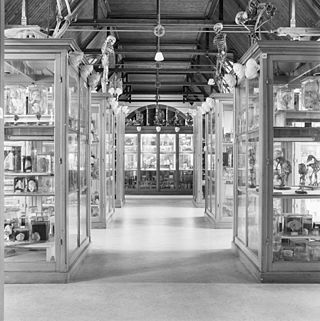
The Zoological Museum Amsterdam (ZMA) was a natural history museum located close to Oosterpark in Amsterdam, Netherlands. It was part of the Faculty of Science, Mathematics and Computer Science (Science) of the University of Amsterdam.

Martine Theodora Bax is a Dutch-Canadian art historian and art critic in modern art. Her specializations are the work of Piet Mondrian and the relationship between art and Western Esotericism, especially Modern Theosophy and Anthroposophy.

Gerhardus "Gert" Hekma was a Dutch anthropologist and sociologist, known for his research and publications, and public statements about (homo)sexuality. He taught gay and lesbian studies at the Faculty of Social and Behavioral Sciences of the University of Amsterdam from 1984 to 2017.
